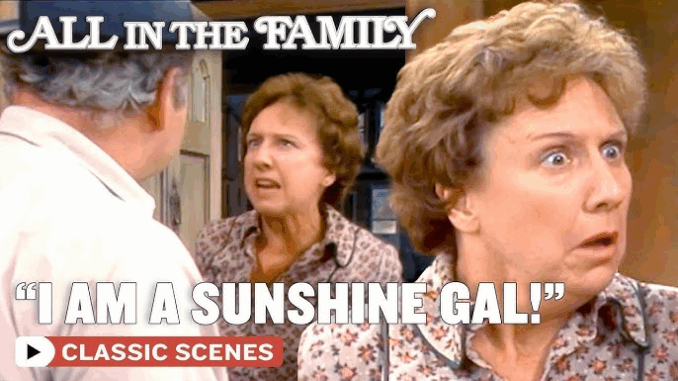
When All in the Family premiered in 1971, it did more than entertain—it revolutionized American television. What began as a sitcom featuring a grumpy, bigoted father clashing with his liberal family members quickly became a platform for addressing America’s deepest social issues. The series not only garnered massive popularity but also created a lasting cultural impact that is still felt today.
At the heart of All in the Family was Archie Bunker, portrayed by Carroll O’Connor. A blue-collar worker with a strong penchant for outdated and offensive views, Archie’s character was designed to shock, provoke, and ultimately start a conversation. The show’s brilliance lay in how it turned these shocking moments into a critique of the social and political climate of the time. Archie’s bigotry, while laughable at times, was also a reflection of the conservative, post-World War II America struggling to adapt to the changing tides of the civil rights movement, women’s liberation, and the push for greater societal equality.
But All in the Family wasn’t simply about highlighting Archie’s ignorance—it was about giving a voice to the more progressive characters around him. His daughter Gloria, played by Sally Struthers, and his son-in-law Mike (Meathead), portrayed by Rob Reiner, were both proponents of social change, with a more open-minded approach to race, gender, and politics. The generation gap between Archie and his family was evident in nearly every episode, making the sitcom feel like a battleground where ideas about tradition, progress, and everything in between were debated and examined.
What made the show particularly unique was its willingness to push the envelope. At a time when TV was dominated by family-friendly fare and escapist entertainment, All in the Family dared to tackle taboo subjects—racism, gender roles, class struggles, and the shifting political landscape—in a way that was raw, real, and often uncomfortable. Through humor, the show made it impossible to ignore these issues, forcing audiences to think critically about their own beliefs and the world around them.
The controversies surrounding All in the Family only added to its cultural significance. It was a show that sparked debates in living rooms across the country, with some praising its bold approach and others denouncing its portrayal of controversial subjects. The series was so ahead of its time that it often felt like it was too much for certain viewers to handle. Yet, by addressing sensitive issues head-on, the show forced viewers to reflect on the reality of the world in ways that no other show had dared to do before.
Despite its sharp critiques of American society, All in the Family also had an undeniable warmth. The show’s humor, while biting and often uncomfortable, was always grounded in the deep love and loyalty that connected the Bunker family. The dysfunctional yet endearing nature of their interactions allowed audiences to empathize with the characters—even Archie, despite his faults. This was the brilliance of the show: it was able to highlight flaws while also making room for understanding and compassion, a balance that made it both a scathing critique and a heartfelt family drama.
Even decades after its original run, the influence of All in the Family can still be seen in today’s television landscape. It set the stage for shows like The Simpsons, Family Guy, and South Park, which blend humor with biting social commentary. These shows carry the torch of All in the Family, continuing to push the envelope with regard to what’s acceptable in mainstream entertainment.
Looking back, All in the Family stands as a testament to the power of television as a vehicle for social change. By confronting the real issues of its time, it helped redefine what was possible in sitcoms and television at large. It wasn’t just a show that entertained; it was a show that demanded attention, challenged the status quo, and ultimately helped shape a more progressive dialogue in American culture. Its legacy remains an essential part of television history, one that will continue to inspire and provoke for generations to come.
